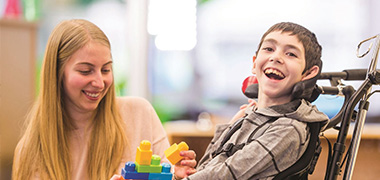
This role has a moderate level of AI exposure. AI can enhance efficiency for some tasks, but this job still relies on human skills and decision-making.
Explore all careersDisability Support Workers provide hands-on assistance to aged and disabled clients, helping with daily tasks, companionship, and community engagement.
Get qualified to work as a Disability Support Worker with a course recognised across Australia. Speak to a training provider to learn more.
Browse occupations related to Disability Support Worker
In Australia, a full time disability support worker generally earns $1,500 per week ($78,000 annual salary) before tax. This is a median figure for full-time employees and should be considered a guide only. As you gain more experience you can expect a potentially higher salary than people who are new to the industry.
 Courses.com.au Team
Courses.com.au Team
Aged and disability support worker jobs have grown strongly in recent times and are expected to continue to do so. As of May 2019, there were approximately 177,000 aged and disabled carer jobs in Australia. Within five years, that number could potentially jump up to 222,000. Some reports indicate the possibility of about 35,800 job openings per year for the next five years.
Source: The Labour Market Information Portal - 2019 Occupational Projections and Australian Government Job Outlook
 Courses.com.au Team
Courses.com.au Team
Although different positions and roles have different requirements, many disability support workers need a qualification in individual support to secure a job. A Certificate III in Individual Support can take 6-12 months to complete and usually requires 120 hours of work placement. Another option is a Certificate III in Individual Support with a specialisation in Aged and Disability Support. This can also take 6-12 months to complete and has a 120-hour work placement component. The exact duration of these learning pathways depends on several factors, including whether you opt for online, on campus or blended study modes and if you study full or part time.
 Courses.com.au Team
Courses.com.au Team



Disability Support Workers help those in need live their everyday lives. This hands-on assistance can take many forms, as these professionals aid aged and disabled patients and clients in an effort to help them live as freely as possible. Duties can include travelling with them to classes and other community programs, running errands, carrying out home-based duties such as cooking, cleaning and personal hygiene and providing overall companionship. The position requires strong personal and communication skills.
The needs and wants of patients and clients will often determine the daily professional obligations of a disability support worker. Sometimes workers will have multiple clients to visit at regularly scheduled times throughout the week. Other times disability support workers will live with those they aid. Because of this, hours and location of work can vary.